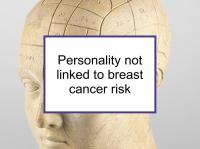The belief is that certain personality traits are more prevalent among women who develop breast cancer is commonly held. While a possible connection between stress and breast cancer is plausible, it is difficult to devise a mechanism of action that would account for an association between specific personality traits or a "cancer personality."
In fact, no such connection has been found in the numerous studies that have been undertaken to examine this question.
Now a large new study that examined the associations between breast cancer risk and perceived stress, decisiveness, having a reason for living, and ease of anger arousal has found no links.
Psychological factors and breast cancer survival
Stress and personality are likely to affect breast cancer treatment and survivorship in several ways. Perhaps one of the obvious effects of a high level of stress or a personality that does not incorporate superior coping skills is an inability navigate breast cancer diagnosis and treatment in an optimal fashion.
Unless a woman's breast cancer is remarkably uncomplicated (i.e., a single, small, node-negative, early stage hormone receptor positive tumor that can be treated with lumpectomy followed by radiation), there are likely to be a number of important decisions to be made regarding treatment and the women herself may have to exert some effort to obtain appropriate treatment in a timely manner.
While ideally there will be a member of a the cancer treatment team to guide a patient through this process, in practice this seldom occurs.
A detour into alternative cancer treatment (such as an attempt to cure the cancer with a specialized diet), triggered in part by anxiety about treatments such as surgery, radiotherapy or chemotherapy, can also result in a suboptimal outcome for those who would need additional support to proceed immediately with the most effective available medical treatments.
Delays in treatment, for whatever the reason, can potentially result in a suboptimal long-term outcome, especially for those with aggressive types of breast cancer. However, there have not been many studies that have attempted to assess the impact of level of stress or personality on long-term survival from breast cancer.
Latest research: No link between psychological factors and BC
The Japanese study referenced above was designed to investigate the association between breast cancer development and psychological factors.
The authors previously reported that having decisiveness and ikigai (a Japanese term meaning a reason to get up in the morning or purpose for living) are associated with lower risk of breast cancer.
However, recognizing that no psychological factors have been convincingly linked to breast cancer in other studies, the authors performed a larger follow-up study to confirm the associations.
To conduct the study, the authors used the final data from a large-scale Japanese prospective study of 29,098 women. A total of 209 new cases of breast cancer were diagnosed during the study period (maximum length: 21 years).
Analysis of this data found no significant relationships between breast cancer risk and the following four psychological traits: decisiveness, having ikigai, ease of anger arousal, and perceived stress.
The authors comment that their results are consistent with previous studies, finding that psychological traits are not likely to be a significant risk factor for breast cancer.
